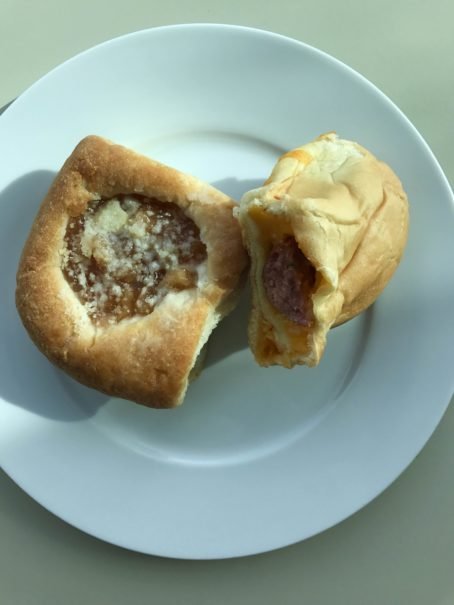
Don’t Mess with Czech‑Texan Breakfast Food

Don’t Mess with Czech‑Texan Breakfast Food
Kolache in Texas
“I’ll have a kolache.”
“A croissant?” the woman at the mid-Missouri donut shop attempted to clarify.
“No, a kolache.” We went back and forth in a similar fashion a few more times before the I realized that the next few years of graduate school would be void of the Texas breakfast staple.
So I learned to make my own. I lovingly recreated the subtly sweet, fluffy dough, which would soon be tightly wrapped around a juicy cut of kielbasa. Jalapeños and sharp cheddar tucked inside are optional accoutrements for some, but not me. So in they went. I served them up to my new friends, and was horrified when they declared: “Oh, it’s like pigs in a blanket.” To compare the heavenly combination of thick-cut sausage, melted cheese and a small kick of a pickled pepper to pre-packaged croissants and cocktail weenies (best enjoyed while drunk) was an abomination.
My fascination and now fully developed appreciation for the art of kolaches continued when I moved back to Texas, where the savory pastries are part of the morning routine. But even here there is confusion. Ask a Czech-Texan, the people who originally brought kolaches to the Lone Star State, about the sausage roll, and they’ll tell you that it isn’t a kolache at all.
In the Czech tradition, what Texans colloquially refer to as the kolache is actually a klobasnek. A kolache, meanwhile, shares the yeasty bread and heritage of the klobasnek, but is topped with a saccharine fruit compote nestled into an indention in the dough, then topped with chunks of butter coated in sugar and flour. It’s a similarly decadent and delicious morning treat, but its popularity pales in comparison to its savory counterpart.
How did that misnomer of one of the state’s most beloved breakfast foods occur? Maybe klobasnek was too difficult to pronounce in Texas parlance. Maybe a simple labeling error spread to bakeries around the state. Whatever happened, it causes no small amount of confusion for the common Texan and indignation from Czech-Texans, a proud group settled throughout Central Texas.
It doesn’t make any sense. A lot of things in life don’t make sense. But I like to keep my mornings simple and save the big questions for lunch. I’ll have one of each, please.